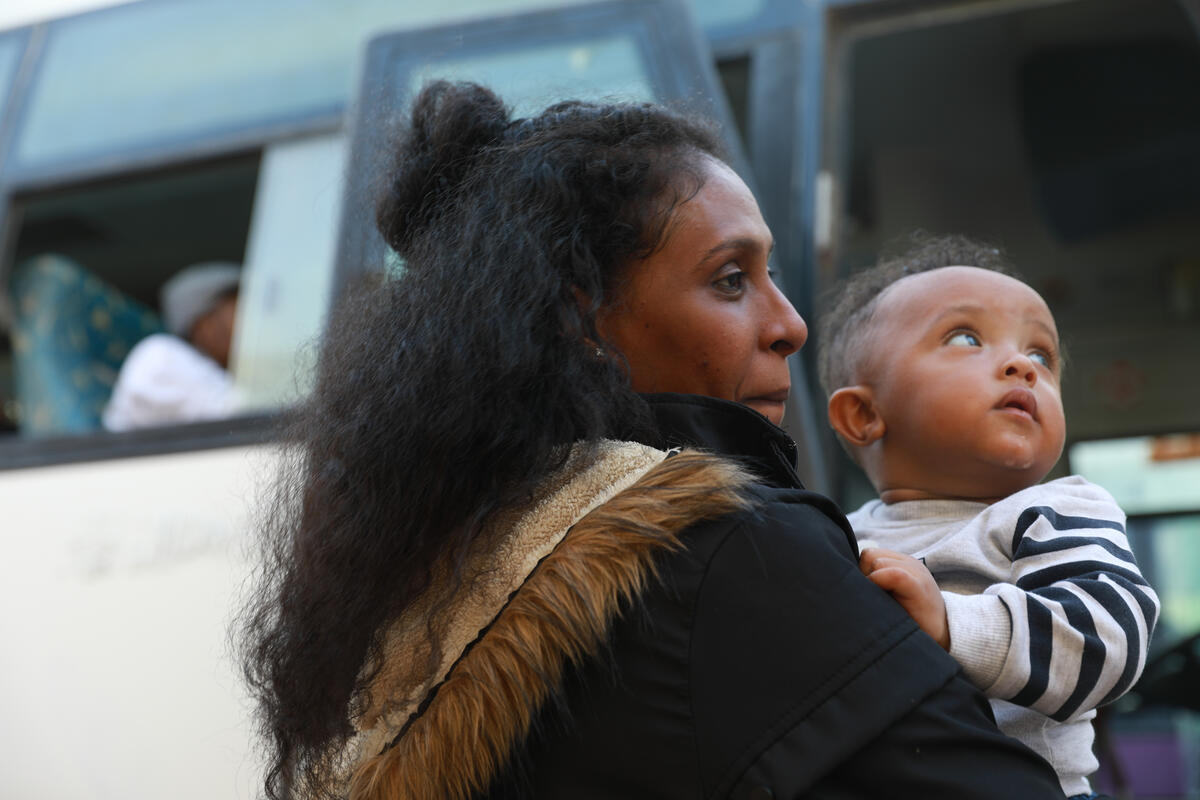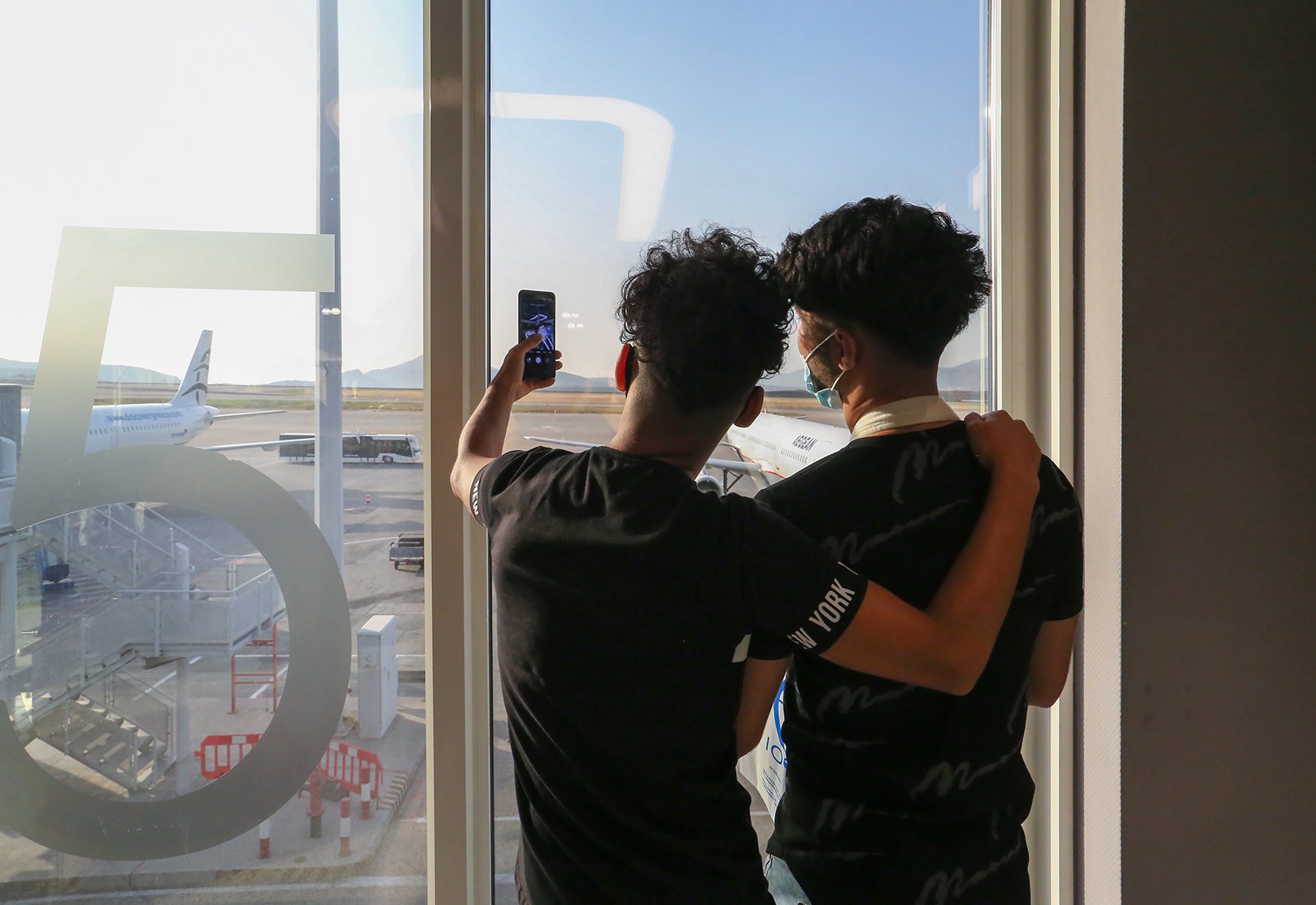UNHCR transfers Somalis to new camp as fresh fighting erupts in Mogadishu
UNHCR transfers Somalis to new camp as fresh fighting erupts in Mogadishu

NAIROBI, Kenya, July 29 (UNHCR) - The UN refugee agency reiterated on Friday that a new camp in north-east Kenya was open and receiving thousands of Somali refugees as renewed fighting in Mogadishu raised fresh concerns about the safety of civilians in the beleaguered city.
In the sprawling Dadaab refugee complex, UNHCR staff are working flat out to relocate refugees who had settled spontaneously on the edge of Ifo camp. "They are being moved to the new Ifo Extension site, which will provide tented accommodation to 90,000 refugees by the end of November," a UNHCR spokesperson said.
Latrines and water reservoirs have been constructed and are in use by the 4,700 people that have moved to this site. "We are planning to move many more in the coming days and weeks. We can count on the full support of the local host community in this exercise and we are very grateful for that," said Fafa Olivier Attidzah, head of UNHCR's office in Dadaab.
The sites, previously known as Ifo 2 and Ifo 3, have been consolidated to form the new Ifo Extension. Infrastructure near completion includes a health clinic, three schools and four water wells that will service the whole site. More than 100 houses that are almost ready will be given to extremely vulnerable refugee families.
The British charity, Oxfam, has installed three water storage tanks with a total capacity of 30,000 litres in Ifo Extension. Médecins Sans Frontières-Spain is providing primary health care services from a clinic on the outskirts of Ifo camp. It plans to construct three additional health posts inside Ifo Extension.
"The families that have moved into Ifo Extension look very happy in their new tents. They are already settling in. You see women collecting water or cooking meals for their families over an open fire. Children run around playing," said UNHCR spokesman William Spindler. "Life is still very difficult, but their living conditions are much better here than they were on the outskirts of the camp."
Work has also started on another site, near the Hagadera camp, known as Kambioos, where the land is being cleared. Plots are being demarcated and tents will be erected to accommodate 90,000 people. By the end of November, 180,000 people will have been moved to both the Ifo Extension and Kambioos sites.
While UNHCR's airlifts have brought thousands of tents to Dadaab, they are not enough to meet the needs of the growing refugee population. Some 45,000 tents are needed to provide emergency accommodation. Since the beginning of the year, 114,000 Somalis have arrived in Dadaab, including about 30,000 awaiting registration on the edge of the camps.
Meanwhile, UNHCR is concerned about the protection of civilians in the Somali capital amid renewed fighting between pro- and anti-government forces. An offensive on Thursday by pro-government forces in and around the important Bakara and Balcad markets has increased the risk for Mogadishu's citizens as well as the estimated 100,000 internally displaced people (IDP) who have fled drought and famine in neighbouring regions in recent months.
UNHCR staff in Mogadishu were confined to their compound as a result of the outbreak of fighting in Wardhiglleey district mid-morning. Many inhabitants had already fled the area in recent months due to previous heavy fighting.
The refugee agency has carried out a protection assessment in one of the largest IDP settlements in Mogadishu - Badbado - nine kilometres from the city centre. In conjunction with other agencies, UNHCR will carry out an assessment in a further 10 settlements in the coming days.
Meanwhile, the number of Somalis who have fled their homeland this year to escape the mix of conflict, drought and recent famine has now reached almost 200,000, including the 114,000 in Dadaab and 75,000 in eastern Ethiopia's Dollo Ado. The influx continues at the rate of 240 a day in Dollo Ado and 1,300 daily in Dadaab. An upsurge in new arrivals is expected due to the renewed fighting in Mogadishu.
In the Dollo Ado area, new refugees continue to arrive weak and emaciated from hunger and the long trek from their villages, mainly in the Bay, Bakool and Gedo regions of southern Somalia. Bakool is one of the regions in Somalia that has been declared in famine. One in three children arriving in Dollo Ado from Somalia is malnourished.
UNHCR and partners continue urgent work to complete the development of Hilaweyn, the fourth refugee camp in the Dollo Ado area. It will have the capacity to shelter up to 60,000 refugees. The establishment of water and sanitation infrastructure in the new camp has been one of the main pre-conditions for its opening.
Oxfam, which has been tasked to develop water and sanitation in Hilaweyn camp, expects to have water supply for up to 3,000 people by Monday and for 10,000 people by the end of next week. In addition, temporary latrines are being dug to allow for the start of refugee transfers to the camp. Other partners setting up primary health facilities and nutrition programmes.
Malnutrition remains a major concern in Dollo Ado. Due to the severity of the situation inside Somalia, malnutrition is affecting a large number of children aged up to 18. Eighty per cent of new arrivals are under 18, necessitating screening of all of these children so that they can enter feeding programmes as required.
UNHCR and its partners are now identifying those in need of immediate nutritional and medical help. The camp population itself is also being monitored in a door-to-door screening of malnourished children, who are then referred to nutrition programmes. Screening by MSF-Spain at the reception and transit centre is also continuing.
A supplementary feeding programme managed by Save the Children (USA) is providing twice-daily servings of high nutrient porridge to more than 1,500 children. These efforts are to be complemented with hygiene promotion and public education about the health services available. Increasingly, recent arrivals are reporting that they made the decision to flee when the last of their animals died and they had no further source of income or food.








